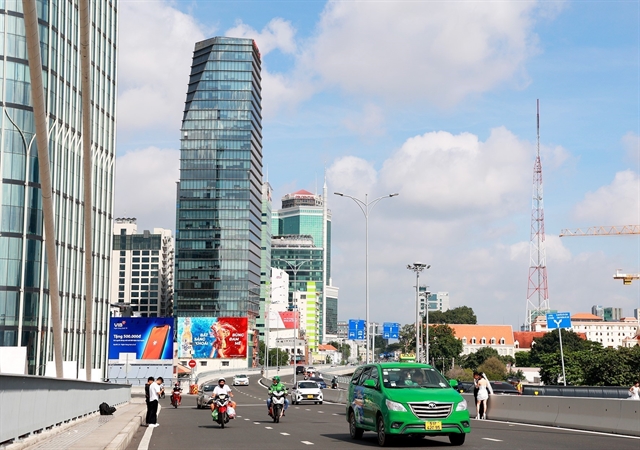 Economy
Economy

 |
| An office building in HCM City. — VNA/VNS Photo Hồng Đạt |
HÀ NỘI — Hà Nội and HCM City continue to attract investors thanks to the competitive rental costs for offices and high-end retail spaces, accompanied by a high occupancy rate in the region, according to Savills Việt Nam.
The Savills' Regional Office Prime Benchmark in the first half of 2023 showed that in terms of occupancy costs, HCM City ranked 12th and Hà Nội 17th of the 21 studied Asia Pacific cities. Rent in both cities was competitive. For instance, rent in Hà Nội was recorded at US$41.6 per sq.m per month, much lower than that in Seoul ($97.6), Singapore ($100) and Beijing ($101.7).
Therefore, Savills experts believe that HCM City and Hà Nội are highly promising Asian places, with consistently high office occupancy rates.
According to Savills Vietnam's report on Real Estate Price Index (SPPI), occupancy rates in Hà Nội’s office market reached 82 per cent for Grade A, 85 per cent for Grade B, and 92 per cent for Grade C. In HCM City, the average occupancy rate of the entire market remained at 92 per cent in the second quarter of 2023.
Substantial office demand reflects strong business activity, burgeoning industries and a thriving corporate landscape in both cities. High occupancy rates and competitive rent underscore the attractiveness of HCM City and Hà Nội to businesses seeking to establish or expand their operation within Asia, the experts said.
Meanwhile, the EuroCham report on Business Confidence Index (BCI) showed that Việt Nam's economic outlook is soft, with headwinds likely to dampen the performance for the third quarter.
However, according to the report, Việt Nam remains attractive to foreign investors when 36 per cent of 232 respondents still consider Việt Nam within their top five investment destinations.
Besides that, in comparison to other markets in the Asia-Pacific, prime retail rents in Hà Nội and HCM City are also competitive.
The average rental price of upscale retail space reached $75 per sq.m per month in Hà Nội and $152.8 in HCM City, lower than other markets such as $365 in Singapore, while Hong Kong is the most expensive market with the price at $787.8.
Matthew Powell, director of Savills Hanoi, said: “Việt Nam is always a very attractive destination for retailers, not only for luxury brands, but also for fashion retail, entertainment, and F&B activities. Việt Nam’s demographics continue to support a robust demand. Demand for new product categories or new brands entering the market is driven by the middle class and young population.”
Regarding the prime retail segment, the Director of Savills Hà Nội reported that stores and brands on the main streets of Hà Nội and HCM City experienced robust business activity. Some stores have high operating efficiency, leading to greater demand for opening more flagships around streets such as Tràng Tiền and Ngô Quyền in Hà Nội.
Lotte Mall West Lake is a recent example of a successful retail development in Hà Nội. When the investor brings a modern, high-end design with guaranteed construction quality and an effective tenant mix, the project is regarded as the premier retail centre in Việt Nam, thereby attracting more tenants and brands to open stores, according to him.
Matthew also analysed that in reality, the shopping malls that have difficulty finding tenants are all malls that follow the traditional model, predominantly focusing on sales functions. Currently, the shopping centres that attract tenants are those that feature experiential retail.
In other markets, such as the United Kingdom, Europe, and the United States, the shopping centre model has progressively evolved into a destination that offers more than just shopping.
According to Matthew, Việt Nam has an excellent opportunity to benefit from these experiences and develop flexible retail models. In some respects, the pandemic is a significant force that hastened the transformation of the global retail landscape.
Regarding shophouse retail space, there is always a high demand for premier retail space in the city centre. The situation of returning retail space on central streets in Hà Nội and HCM City can be explained, despite their prime location, because the premises do not satisfy the growing design, technical, and legal requirements of brands, he said. — VNS


.jpg)

